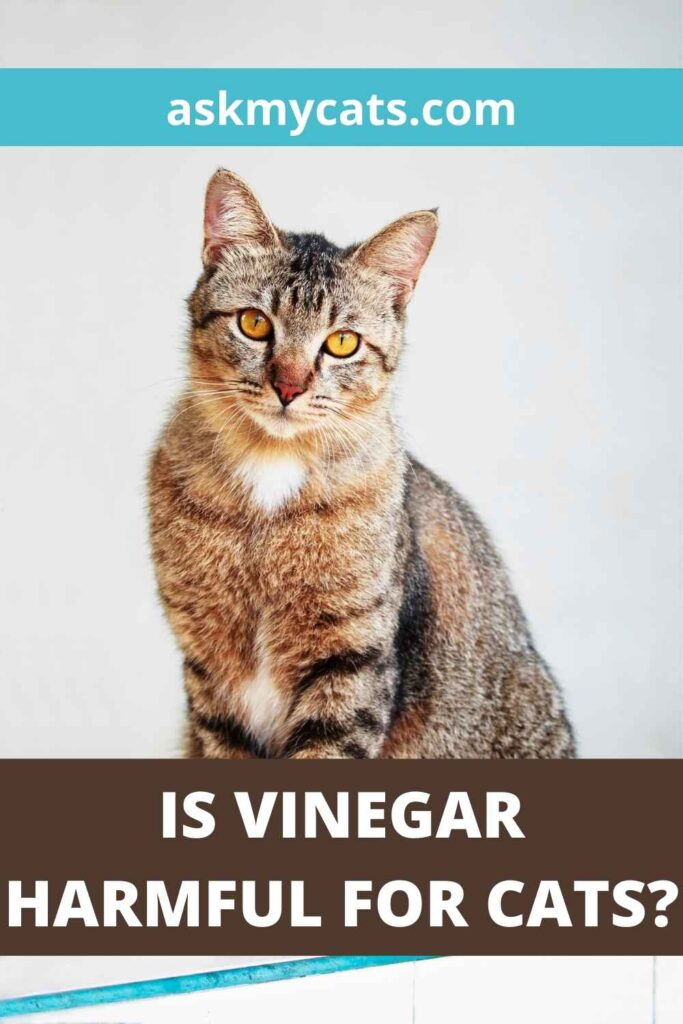It goes without saying that cats cannot be trained to not go somewhere – not even your own pet cats will be taught as well as a dog. But, how then, can you keep your pet cats away from places that are of potential danger to them – such as stoves, harmful plants, or fragile showpieces?
And, while your pet may somehow manage to listen to you and not go somewhere, how can you keep neighborhood cats from entering your backyard, lawn, or verandah?
While their absolute stubbornness makes it difficult to keep cats away from any place, their strong noses with an ability to catch even faint smells can come in handy to us.
You can use different scents of different substances such as black pepper, cayenne pepper, bleach, and even vinegar to do so.
Every substance has its own pros and cons. In this article, we will take a look at how you can use vinegar to make a DIY cat deterrent.


Give Your Cat the Perfect Day
Get the Free Ebook!
Is Vinegar A Good Cat Repellant?

We don’t need a cat’s sense of smell in order to recognize vinegar from its pungent smell. Even we humans cannot stand the smell of vinegar when it gets too pungent. Imagine the plight of cats – after all, they have 200 million odor sensors in their noses, while we humans have just 5 million!
That’s right, a cat’s sense of smell is over 14 times stronger than that of a human! This makes the smell of vinegar, even in very small amounts, too detectable for cats.
Now, if you have owned cats for a while, you will be aware of how picky cats can be about the odors they tolerate. Cats hate strong aromas and pungent, sour, and acidic smells.
Keeping that in mind, vinegar checks all boxes of being hated by cats – it is pungent, it has a sour and acidic smell, and the smell remains strongly detectable even when the liquid dries off from the surface.
All in all, yes, vinegar makes for a very good cat repellent.
Do Cats Really Hate The Smell Of Vinegar?
Yes, cats absolutely hate the smell of vinegar. In fact, while many pet owners use vinegar to clean the litter boxes of their furry babies, it is recommended that they dry the litter box in the sun for enough hours to ensure that the cats don’t stop using the litter box because of the smell of vinegar.
While there are no associated toxicity or health problems with cat smelling vinegar, it is just too strong and pungent for a cat’s liking. Since they hate the smell of vinegar, they naturally avoid places that may have vinegar applied to surfaces.
Check out more details about Do Moth Balls Keep Cats Away?
How To Make A DIY Vinegar Cat Repellant?

It is much easier to make a DIY vinegar cat deterrent than you’d imagine. Firstly, let’s look at all the things you will need to make the repellent.
Equipment and Materials Needed for DIY Vinegar Cat Repellent
- Gloves and a face mask (optional)
- An empty bottle with a spray nozzle
- A sponge
- Tissues
- Tap water
Step 1 – Gear Up
Gather all the equipment and materials that you will need. While this is not compulsory, it is recommended that you also wear gloves and a face mask – vinegar is acidic and its smell can be irritating.
Moreover, if you happen to have any tiny scratches on your hand, any accidental spillage of vinegar on your hand might cause the scratches to burn.
Step 2 – Mix The Vinegar Solution
Take an empty bottle that has a spray nozzle. Add vinegar and tap water to form a mixture.
Now here’s where you will need a little experimentation to figure out what ratio works out best for you-
You can either have equal parts water and vinegar; or, you can opt for a more diluted solution with, say, 2 parts water and 1 part vinegar; or, you can even go for a slightly stronger solution with, say, 2 parts vinegar and 1 part water.
The ratio you choose will totally be dependent on your preferences and situations.
If, say, you have a whole gang of neighborhood cats that come all at once, or if you have a determined, stubborn cat who won’t stop coming even after using dilute vinegar repellent, you may want to opt for a stronger solution.
Interesting Read: Do Fake Owls Keep Cats Away?
Step 3 – Soak A Sponge In Vinegar And Keep It Near Your Plants
Now, this step is especially for those whose plants may get affected by spraying vinegar solution directly on them.
In such a case, you simply need to soak up a sponge in the vinegar solution you made in step 2. Then, simply keep the sponge in the spot where the cats keep coming frequently.
Step 4 – Clean Up Your Counter After Making The Spray
This step is specifically for those who are troubled by neighboring cats but themselves have cats at home. You want to deter the neighboring cats from entering your house and lawns, not your own.
So, wherever you make the DIY vinegar repellent, make sure you clean up well. Otherwise, your cat may get repelled by that smell too.
Also, check out Does Bleach Keep Cats Away?
Does Vinegar Prevent Cats From Urination And Spraying?
Yes, vinegar does prevent cats from urination and spraying. Now, there isn’t any exact or direct relation between the smell of vinegar and the tendency of a cat to spray or urinate.
But, since vinegar keeps cats from coming into the spot in the first place, it automatically also solves the problem of neighboring cats urinating and spraying in your lawns, gardens, or backyard.
If it is your cat that is troubling you with urination and spraying around the house, you may want to use the DIY vinegar cat repellent inside as well.
You might also like to read about Does Black Pepper Keep Cats Away?
Is Vinegar Harmful For Cats?

No, vinegar is not harmful or toxic for cats. In fact, the only problem that cats have with vinegar is its smell. It does not harm the health of cats in any way – just ensure that your cat does not ingest the vinegar liquid directly in large amounts as it is acidic.
Vinegar is safe to use not only as a cat deterrent but even as a cleaner for your household surfaces and your cat’s litter box.
Vinegar is actually one of the mildest and most cruelty-free methods of making a cat repellent to keep neighboring cats. It is much safer and much more effective than other ingredients such as black pepper, cayenne pepper, or bleach.
These other ingredients can actually cause harm to the health of cats. Vinegar, in comparison, is a safer, cheaper, and pretty effective ingredient for making your DIY cat repellent at home.
Also, check out Does Ammonia Keep Cats Away?
Alternatives To Vinegar For Cat Repellants
While vinegar is one of the most cruelty-free, easily available ingredients for making a safe and effective cat repellent at home, there are many reasons why you may not want to use vinegar.
You may not have it available in your house or nearby stores, or your plants may be too sensitive to the acidity of the vinegar, or, simply, you may not like the smell of vinegar yourself.
Whatever your reason may be to not use vinegar, don’t fret. Here are some alternatives that look into for making your very own DIY cat repellent at home:
1 – Citronella Spray
It is made from extracts of grass, but it smells like lemons. It is well established that cats do not like the smell of citrus fruits. So, you simply need to spray some citronella at the spots where you don’t want the cats to come.
The best part about this spray is that its aroma stays even after it rains, and it makes your lawn smell refreshing and nice.
2 – Coffee Grounds
This is another natural, cruelty-free way of keeping cats away from your backyard. Simply take some wet coffee grounds and make a border around your backyard or lawn.
The smell of coffee grounds will keep the neighboring feline intruders away from your land, and what’s more, the coffee grounds will eventually decompose and nourish your soil.
More details: Do Coffee Grounds Keep Cats Away?
3 – Garlic
Now, this isn’t exactly a pleasant alternative. But desperate times may call for desperate measures. Garlic has a very strong and pungent smell, so naturally, it will keep the neighboring feline intruders from entering your backyard or lawn.
But this particular repellent may cause your backyard to stink, especially if it rains. So, exercise caution and use this one at your own discretion.
4 – Motion-Activated Sprinklers
Cats hate water. You may know this if you have a cat that you’ve tried to give a bath. Cats really aren’t a fan of having water touch their body – especially not the feral felines that roam the streets and intrude on your backyard and lawns.
Using a motion-activated sprinkler will spray some water on the intruding cats and startle them. When this happens twice or thrice, the felines will start associating your backyard with water and not approach it.
Note that you should keep the intensity of the jet spray low. You only need enough intensity to startle the cats – in any case, the jet spray should not harm the cats in any manner.
Also, check out Will Cayenne Pepper Keep Cats Away?
Frequently Asked Questions
What can I spray on my porch to keep cats away?
There are a variety of scents that cats hate. You can make your own DIY cat repellent from any one of those scents, some of the most effective and safe ones being lemons, vinegar, citronella, lavender, etc.
What is the permanent solution to stop neighboring cats from entering my porch?
Get to the root of the problem. See if there are any open trash cans on your porch or street, and take care of the hygiene of the porch and street. Ensure there are no leftover cat food cans kept in the open, as that smell may lure other cats in.
Final Words
Cats are a fun pet to have but can be a nuisance if they keep coming over to your porch or garden uninvited and wreak havoc.
While many people may be tempted to use any means possible to keep the neighboring intruding felines away, we must always keep in mind that our actions should not harm the cats’ health in any way.
They are, after all, just animals. We can’t expect them to know not to trespass.
The best way, thus, is to use mild, safe, and effective substances like vinegar to make cat repellents that deter cats without harming their health.
Interesting Read: Do Used Tea Bags Keep Cats Away?
Also, check out: Does Irish Spring Soap Keep Cats Away?
Must Read: 5 Natural & Safe DIY Home Remedies to Keep Cats Away

Just sprayed vinegar with lemon essential oil on our porch to keep the neighbors cat aw(I’m allergic)
ITS working!